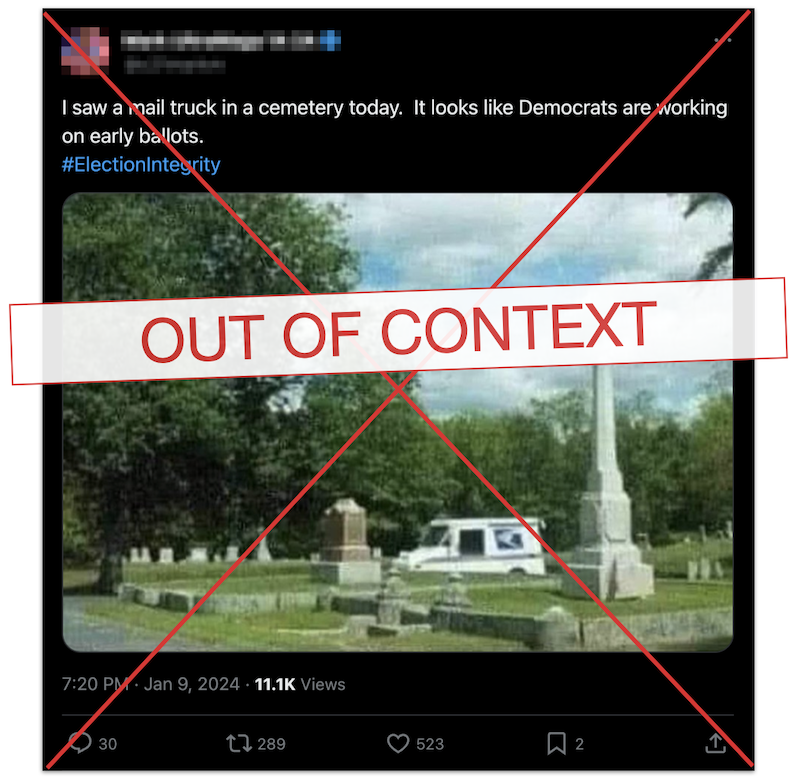It’s one of the spookiest zombie claims out there about voter fraud: Dead people are voting.
Former President Donald Trump has said this multiple times, including after losing the 2020 election.
In January 2021, Trump told Georgia Secretary of State Brad Raffensperger that “close to 5,000” dead people voted in the state. But officials found only a handful of cases.
Social media users also have falsely claimed that hundreds of thousands of ballots were sent to dead people — and pets — in Virginia and Nevada.
As evidence, these posts often share the same photo of a mail truck in a cemetery, some claim Democrats have something to do with it.
It’s possible to view these social media posts — many with laughing emojis — as a joke, which is why we aren’t fact-checking these claims on our Truth-O-Meter. However, these posts spread the falsehood that U.S. elections are marred by widespread fraud.
(Screengrab from X)
“It is sadly another tactic to sow distrust in the election process by bad faith actors,” said Thessalia Merivaki, an American politics associate professor at Mississippi State University. But the process to verify voters’ identities is “robust” across states, and people can be charged with voter fraud if they try to get a ballot on behalf of a dead person, she said.
Donald Kirk Hartle, a Nevada Republican, told a TV station in 2020 that he was “surprised” that someone cast a ballot in his late wife’s name. His claim eventually collapsed, as investigators concluded that Hartle had cast the fraudulent ballot.
In summer 2022, we found instances of people prosecuted for casting mail ballots in the name of a dead person in recent years. But these cases were sporadic and did not change an election’s outcome. Some media outlets reported that some of the people voting in this way voted for Trump.
Mail truck photo comes from a blog post about relationship closure
We traced the photo of the U.S. Postal Service truck parked in a cemetery to a July 2019 blog post titled “Delivering mail to a cemetery.” Gina DeNicola, author of the blog “Heart Written Words,” confirmed to PolitiFact that she took the photo at Mount Olivet Cemetery in Nashville, Tennessee, where she lives. When she saw the truck drive into the cemetery to deliver mail to the funeral home’s office, she snapped a photo and began brainstorming her next blog post. Her blog entries are largely about her life experiences.
In the July 2019 post, DeNicola wrote that the mail truck and a conversation with a friend inspired her to write a letter to the “men from my past” to get closure about old relationships. DeNicola shared the blog post on her social media accounts, as usual.
But social media users misconstrued the photo.
DeNicola, a registered Democrat, said she was “completely unaware and very surprised” that social media users took her photo out of context and said she regrets that it’s being misused to spread false claims about dead people voting.
A Mount Olivet Funeral Home and Cemetery spokesperson said the photo was likely taken at the cemetery, but it was difficult to say for certain because the cemetery spans more than 200 acres.
Why dead people’s names on voter rolls do not equal fraud
Typically when voters die, it’s rare that their relatives contact the local elections office to ask that the person be removed from the voter rolls. But elections offices routinely receive death records from state and federal sources and then remove dead voters from voter rolls.
Errors happen, too, but that doesn’t mean they’re linked to nefarious activity.
For example, in Michigan a few years ago, a voter born in 1823 was listed in the voter rolls, but that was because of a typographical error. Also, having a dead person’s name on state voter rolls does not automatically equal fraud. It’s a crime only if someone fills out a ballot in a dead voter’s name and sends it in.
Each month, Tennessee’s Davidson County, which includes Nashville, removes voters identified through health department-supplied death certificates, said Jeff Roberts, the county’s elections administrator.
Many states are part of the national Electronic Registration Information Center, which sends reports to member states showing when voters have moved or died. Many Republican-led states stopped participating in 2023, after misinformation spread about the center’s funding.
State laws vary on whether ballots from voters who die before Election Day should be counted, the National Conference of State Legislatures found.
In the November 2016 election, Michigan rejected more than 1,780 such absentee ballots.
PolitiFact Researcher Caryn Baird contributed to this story.
RELATED: Successful program finds voters who moved or died. Why are states leaving it before 2024 elections?
RELATED: Debunking the zombie claim that ‘dead people always vote Democrat’
RELATED: All of our fact-checks about elections
